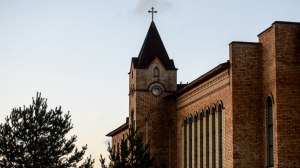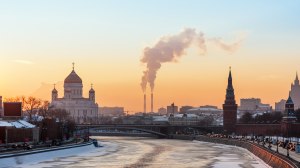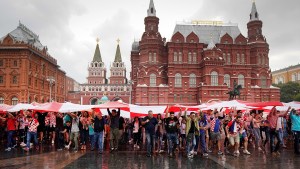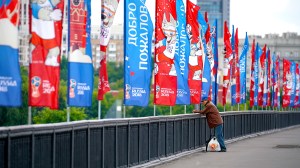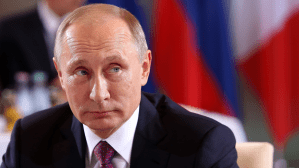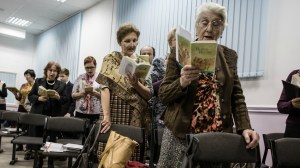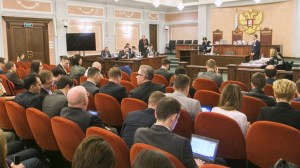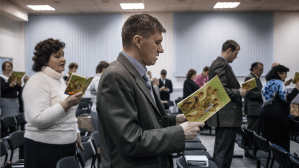In this series
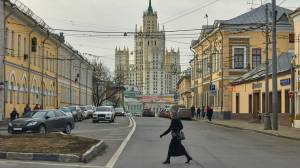
For half a decade, Russian evangelicals have feared the repercussions of anti-extremism laws that monitor and restrict religious life in the country. New amendments to the religion laws, set to go into effect this month, extend government regulations on religious training following a string of recent seminary shutdowns.
The country has mandated that all clergy, religious leaders, and missionaries who were trained abroad take a course in “state-confessional relations in the Russian Federation” and then become recertified by a centralized religious organization, Forum 18 reported earlier this year.
Like many Russian evangelical leaders, Moscow Theological Seminary president Peter Mitskevich is concerned about the implementation of the new amendments, which are said to be the biggest increase in government control of religion since the 2016 Yarovaya law banned evangelism in the country.
“We want to work legally in Russia so we can focus on influencing Russia for the gospel,” said Mitskevich, who also serves as executive director of the Russian Baptist Union. “We are taking steps to make sure we understand the requirements and try to meet all the issues.”
Moscow Theological Seminary has already experienced the effects of the country’s legal oversight. The seminary lost its license and had its buildings sealed after an inspection by the Federal Service for Supervision in Education and Science (Rosobrnadzor) in October 2018.
The agency reported the seminary had lacked a “developed and approved educational program” and listed what government inspectors considered occupational safety and health issues. It wasn’t until July 2021 that the government issued a new license for the school to reopen.
Mitskevich attributed the problem to what he called “paperwork and bureaucracy” and described the new license as “a miracle from the Lord.”
Moscow Theological Seminary was one of three Russian evangelical seminaries whose licenses have been annulled in the past three years.
As Forum 18 reported, Russian Pentecostal Union’s Eurasian Theological Seminary lost its license in November 2018 after court cases brought against it by Rosobrnadzor. The Evangelical Lutheran Church of Ingria lost its higher education license on April 6, while another Lutheran seminary is fighting in court to keep its license.
Russian evangelical leaders said they had anticipated further regulations even before President Vladimir Putin signed them into law in April.
Many churches and ministries in Russia began strategizing several years ago to ensure their pastors and other staff members with degrees from foreign universities or seminaries enrolled in religious studies programs at Russian institutes of higher education, according to Alexander Negrov, former president of St. Petersburg Christian University.
“The majority of current faculty members at St. Petersburg Christian University all have Russian state-approved degrees along with courses in religious studies,” said Negrov, who moved to the US and founded the Hodos Institute in 2013. The institute focuses on ethical and moral leadership training for the Eurasia region.
The requirements for those trained abroad apply to both citizens and noncitizens of Russia, but the 2016 Yarovaya law caused practically all foreign missionaries to leave the country.
Konstantin Bendas, president of the Moscow-based Foundation for the Support of Christian Culture, Science, and Education, said he considered the amendments equivalent to or even more stringent than the provisions of the Yarovaya law.
While the 2016 law mostly targeted the external activity of a religious association, such as gathering and evangelizing, Bendas said the new changes concern the church’s inner life, such as education and hiring. The education requirements apply to clergy and nonclergy and target those with a teaching or leadership role in a ministry.
“From now on, the state can check everyone who, during the service, rises on the stage and generally shows some kind of activity in the church community,” Bendas said.
Russian evangelical leaders say a large part of the uncertainty relates to unequal or unpredictable enforcement of the law. According to Forum 18, the amendments also bar persons designated as “extremists” from participating in religious groups, and companies such as bookshops and NGOs are banned from using religious phrases or designations in their names without permission.
“It’s not really the wording of the law that’s important, but a lot of it is how local authorities are interpreting it,” Negrov said. “We don’t really know what will happen.”
As a result, many leaders fear their ministries could be penalized next. In some areas, law enforcement officials try to enforce the law fairly, but some police officers who don’t know the limits of the law go beyond their jurisdiction.
“Some policemen make a big effort to work with churches,” said Vitaly Vlasenko, general secretary of the Russian Evangelical Alliance. “Other policemen don’t know the law. We need time to educate them.”
A government official described the requirement for additional training for foreign-educated clergy as “aimed at protecting the spiritual sovereignty of Russia.”
In the longer term, evangelical leaders see the amendments as a way for the Russian government to keep out foreign ideas and strengthen the ties between the Kremlin and Russian Orthodox Church leadership.
Sergey Rakhuba, president of Mission Eurasia, a mission agency to Eastern Europe and Russia based in Franklin, Tennessee, called the amendments “a very powerful tool.”
“It’s part of the plan the government has had for a long time of working with the Russian Orthodox Church,” Rakhuba said.
Minority faiths are challenged in Russia, particularly if deemed “extremist.” Outside of Jehovah’s Witnesses, who were banned from operating in the country in 2017, evangelicals were the religious group punished the most in the first few years of the anti-evangelism laws.
Mitskevich said that in the past, Russian Christians have found ways to share the gospel even under governmental obstacles. Now, they again will have to find a way to adapt to political conditions.
“We want spiritual unity, the opportunity and freedom to do ministry, build churches, do evangelism, and have schools,” said Mitskevich, who continues to hope for a spiritual awakening in the country. “To do this, all of us will have to adjust.”
One miracle has already happened, he said. Franklin Graham has accepted an invitation from the Russian Union of Evangelical Christians-Baptists to speak on July 9 and 10, 2022, in St. Petersburg during what has been named the Hope Festival. The site of the festival will be the 12,000-seat St. Petersburg Ice Palace.
Mitskevich said Russian churches plan to use the event to spur evangelism efforts throughout the year.
“Pray for big crowds and for many people to hear the gospel,” he said.


